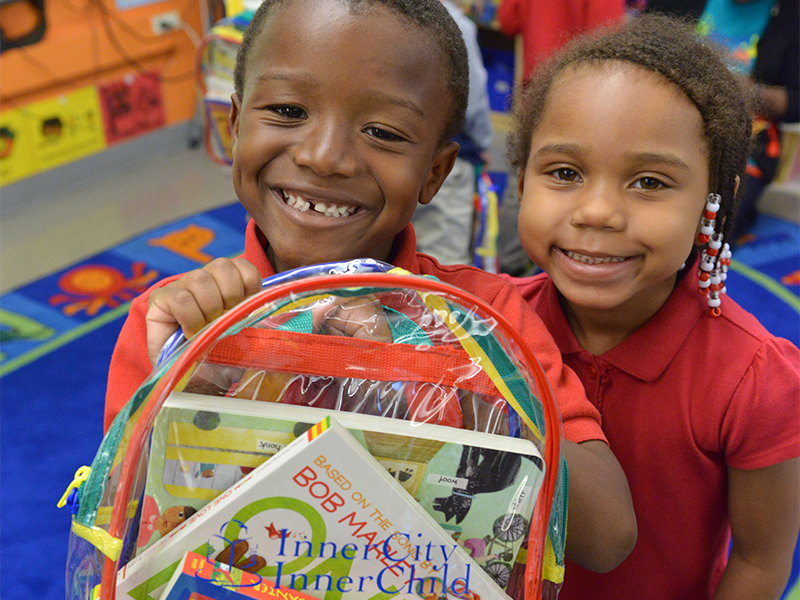Inner City-Inner Child (ICIC) is the outreach arts education program of Dumbarton Concerts, an organization dedicated to chamber music at the Dumbarton United Methodist Church in Georgetown. In 1987, Dumbarton Concerts began taking its music out of the church and “into isolated neighborhoods of Washington, D.C.” These initial efforts resounded with D.C. locals, and over time, gradually expanded into an arts-based literary program for children in early childhood centers. ICIC became official in 1994.
According to ICIC executive director Ingrid Zimmer, their mission is to “improve the quality of early childhood education in Washington, D.C.” “While there are many educated, prosperous people,” she notes, “there is a disparity of education in children ages 0-5 east of the river. Wards 7 and 8 have many families living in poverty.”
Zimmer feels strongly that access to the arts should not be determined by zip code. For that reason, ICIC seeks to equalize differences in educational opportunities by serving children living in high-poverty areas and children attending public and charter schools, Title I schools, free-lunch programs and community-based childcare centers in smaller venues, such as church basements.
For 25 years, ICIC has maintained strong ties with D.C. neighborhoods and continues servicing the neediest children through innovative programs that teach math, science and language arts through visuals, songs and dance. Reflecting upon the successful implementation of ICIC’s educational programs, Zimmer proudly notes that children who participated experienced a transformative power of the arts.
“If you look at portions of brain activity [in the brains of children who engage in arts learning programs], you’ll see these children are more receptive to learning [when arts education is present] and less able to intake information when they are simply told to ‘sit down’,” explains Zimmer. She says that music helps the brain more than rote memorization.
Zimmer also refers to a widely circulated quote from the 2000 Nobel Prize winner of economics, James J. Heckman, “Early learning begets later learning and early success breeds later success just as early failure breeds later failure.”
Like many other proponents of early childhood education, Zimmer uses Heckman’s quote to emphasize the importance of ICIC’s arts integration programs for children in the first five years of their lives to set them up for greater success in life. What better way to do that than by introducing very young children to original programming that relies on participation-heavy performances and visual arts to teach them?
Delivery of Services
ICIC delivers its programs a bit differently among the different age groups. It administers arts programs for infants to18-month-olds, toddlers 18-to-36-months old, toddlers 2-3-years old and preschoolers ages 3-5. Zimmer discusses the importance of offering programs differentiated by age due to children’s abilities throughout the many developmental stages of early childhood.
In collaboration with professional educators and musicians, ICIC has created three unique methodologies to deliver its literary arts programs. The first and most popular is residency programs. Dubbed “Dancing with Books,” the program comes to life directly in the classroom for 10 weeks at a time. ICIC hires teaching artists and professionals specializing in early childhood development to administer the programs onsite.
Focusing heavily on African drums and dances, Dancing with Books flows easily into the brains of children as they can’t help but to be inspired by the enthusiasm of the leaders and catchy beats, often completed with rhythm sticks or repetitive claps.
In fact, as the children are learning visual arts, cognitive and social emotional skills, math, science and language arts literacy skills during each high-energy session of Dancing with Books residencies, it is normal to see them become transformed through the power of the arts. Learning is no longer standardized or repetitive – it becomes a source of inspiration that motivates children to get jazzed up, dancing and moving to the beat of the music.
ICIC has published videos on its website and YouTube giving highlights of this special program.
The second original program is “Naptime U.” ICIC created this professional development program for teachers and offers it onsite during traditional afternoon nap schedules after lunch. ICIC staff hires teaching artists to create and deliver a variety of interesting teacher training programs that are certified by Washington, D.C.’s Office of the State Superintendent of Education and correspond with common core principles.
The third program is “Read with Me,” in which ICIC staff gives family literacy workshops to children and their parents and caregivers. These workshops typically last an hour. “We teach parents how we sing and dance the books and we also do puppet shows. We send books home with the kids after every workshop,” says Zimmer.
ICIC delivers its services for free, relying on corporate donations and grants from D.C. arts organizations. ICIC also does its own fundraising.
During COVID-19, Inner City-Inner Child continues to support those conducting learning at home and is providing virtual instruction. Visit innercity-innerchild.org for updates.
Follow-Ups
ICIC limits its residencies to once per year per recipient location; according to Zimmer, it doesn’t have the resources to administer multiple residencies in the same calendar year. Despite its limitations, however, ICIC plans to do residencies in 55 different classrooms in 2020! Zimmer also explains ICIC doesn’t take a one-and-done approach. A minimum of 10 workshops and follow-up coaching are needed. The goal is to stay with each early childhood education center for several months.
The quantitative data cannot be ignored – the work of ICIC is having positive impacts on children and their families and succeeding in its goal for children to undergo a transformative power of the arts. According to its 2019 annual report, “6,567 low-income preschool children benefited, [a whopping] 486 workshops given, and 541 early childhood educators trained.”
To learn more about the impact ICIC is having on low-income children in vulnerable neighborhoods in D.C., visit innercity-innerchild.org/.

